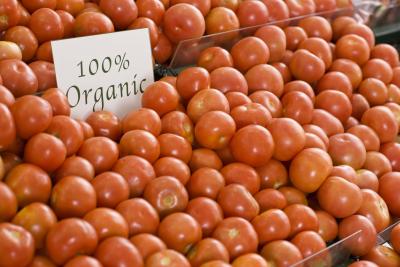When you wander the aisles of the grocery store, it seems that every food item has both an organic and non-organic, or conventional variety. Since the 1990s and into the 21st century, organic foods have grown in popularity. By 2005, 4 million acres of farmland were dedicated to organic farms, up from 1 million in 1990, according to Dr. Alan Greene at The Daily Green. When you’re pregnant, you may wish to eat more organic, or exclusively organic to protect your baby from exposure to pesticides.
What is Organic?
To produce organic food, a farmer cannot use insecticides, herbicides or chemical fertilizers. Organic animal farmers do not give their animals growth hormones or antibiotics. The animals should have access to pasture. The United States Department of Agriculture (USDA) has specific rules for what foods can be labeled organic. If a food contains only organic ingredients, such as an apple or pear, it can wear the “100 percent organic label.” If 95 percent of its ingredients are organic, such as a loaf of bread or box of cookies, it can wear the “organic” label. Foods made with at least 70 percent organic ingredients can state that they are “made with organic ingredients.”
Benefits
When you eat organic foods during pregnancy, you keep pesticides and other chemicals out of your body and out of your baby’s body. If you choose to eat organic processed foods, such as an organic frozen dinner or salad dressing, you are avoiding food additives such as MSG, artificial sugars and preservatives, according to MayoClinic.com. Choosing organic meat and milk can also give you a boost of omega-3s, according to Greene., which your body needs for brain and eye formation and development.
Considerations
One thing that may prevent you from reaching for the organic fruit over the conventional fruit is the price. Organic foods can cost anywhere from 10 to 100 percent more than regular foods, according to “Business Week” magazine. In some cases, the cost may not be worth it. For instance, pesticide residue is located in the peel of many fruits. If you eat an orange or banana, you’ll toss the pesticides away, so it may not be worth the extra money to buy organic. For vegetables such as potatoes and fruits such as apples, it is worth the extra money, as those tend to have the highest amount of pesticides.
Misconceptions
The word “organic” does not always mean “healthy.” Organic white bread still has less fiber than a regular loaf of whole-wheat bread. In some cases, organic refined flour lacks the vitamin fortification required of conventional refined flour. Organic food isn’t necessarily safer food, either. Even though it is free of pesticides, organic produce can still be dirty. Wash any vegetables and fruits well before eating them. Observe the same safety procedures for preparing organic meat and dairy products as you would for conventional meat.
If You Can’t Find Organic
Even if you can’t find organic foods in your local supermarket or on the menu at your favorite restaurant, you should eat a healthy, balanced diet full of vegetables and fruits when pregnant. The Environmental Working Group released a list of 15 conventionally grown vegetables and fruits that contain low pesticide levels. On the list are onions, which naturally repel pests; asparagus, broccoli and peas, which do not need many pesticides; and fruits with thick rinds, such as watermelons, mangoes, avocados and pineapple.





